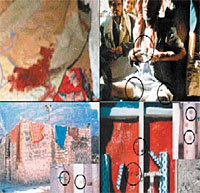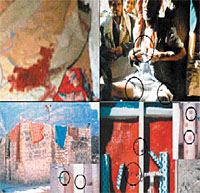
Killer’s house burnt following last week’s mosque massacre, and families still not satisfied:Capital punishment sought [Archives:2003/656/Front Page]
August 4 2003
 |
Mukalla, 3 August – Family members of the children killed in last Wednesday's mosque massacre have demanded the authorities to quickly prosecute and issue the death sentence against the murderer of 9 people, mostly children aged between seven and 16, in “Ti Qura” village the province of Lahj, 300 kilometers south of Sana'a.
Families outraged
Families of the victims had already burnt down the house of the murderer, Muhsin Yahya Munassar, 42, after it was emptied from its residents and furniture. “Families were furious and frustrated. Never before had such a horrific incident taken place in the area and even in the whole country” one of the villagers told Yemen Times.
Muhsin's wife and children -two teenage daughters and a week-old infant- have become homeless and sought refuge at a relative's home following this act, which indicates the massive anger of the victims' families.
Motives unknown
According to preliminary investigations, the killer's motives are still unknown, but the man did suffer from psychological problems since he was stripped of his position as an army colonel after Yemen's 1994 civil war.
He also underwent a recent heart surgery, which seemed to have resulted in further deterioration in his health, and left him nervous and in bad mood, according to villagers. Muhsin retired from his work as at the Political Security Office six months ago for health reasons. Medical sources said that the murderer suffered from a heart attack one day before he committed his massacre.
Security sources denied that there are partisan motives or conflict behind the crime as the killer is a member of the ruling party and an officer in the intelligence.
People in the area are in a state of shock and bewilderment as the crime was beyond their assimilation. They demand a heavy penalty against the killer who caused panic and mourning all over the village. People expect a quick trial of the murderer.
The Ministry of Religious and Endowments is not happy with such summer camps meant for religious teachings. It says that such courses run by charitable societies should be monitored by the ministry. The government is afraid that these camps might be used for fanatic purposes.
Online warfare
The murder turned into a debate and media barrage between the media internet websites of the ruling party The General People's Congress (GPC) and Islah. The GPC website (www.almotamar.net) said the killer was a mosque sermon preacher and is a member of the socialist party, while al-Sahwa website (www.alsahwa-yemen.net) refuted such allegations and said he is an officer in the intelligence and is a member of the ruling party. However, investigation authorities said they do not care about the political affiliation of the killer rather they are interested in the motives behind the crime.
Relative and neighbors said that even though the man was not a fundamentalist or a religious person, yet he used to pray on many occasions in the same mosque, where he committed his evil act.
Massacre described
A few children, including seven-year-old Nabeel, survived the machine-gun attack a medical source said.
Nabeel described the incident to authorities by saying that the killer came to the mosque and called his son out, and then he returned to the mosque and started shooting at the Quran instructor “Faruq”, who was killed instantly and followed that by shooting at students randomly. He continued shooting until he ran out of ammunition, and then shouted “Is anyone still alright?” and was then arrested by the villagers who quickly gathered around the mosque to realize the death of seven students and their teacher, while an eight student died at the hospital a day later. The man was heard shouting “Now I am truly relieved! Don't grill, just get me killed!” when he was dragged to taken to the police.
It's weapons again
This is the second reported crime of its kind where people are attacked in a Yemeni mosque. A similar attack in January 2001 resulted in the death of four men and injury of 18 when an armed man attacked men praying in a mosque in Amran, 50 km north of Sana'a.
Violence in Yemen is quite common due to the high number of firearms held by civilians, which is officially estimated at more than 60 million pieces, i.e., an average of more than three weapons per person. A disarmament law is yet to be approved by the Yemeni parliament to limit the number of weapons in the hands of citizens.
Capital punishment sought
Massacre described
A few children, including seven-year-old Nabeel, survived the machine-gun attack a medical source said.
Nabeel described the incident to authorities by saying that the killer came to the mosque and called his son out, and then he returned to the mosque and started shooting at the Quran instructor “Faruq”, who was killed instantly and followed that by shooting at students randomly. He continued shooting until he ran out of ammunition, and then shouted “Is anyone still alright?” and was then arrested by the villagers who quickly gathered around the mosque to realize the death of seven students and their teacher, while an eighth student died at the hospital a day later. The man was heard shouting “Now I am truly relieved! Don't grill, just get me killed!” when he was dragged to the police.
It's weapons again
This is the second reported crime of its kind where people are attacked in a Yemeni mosque. A similar attack in January 2001 resulted in the death of four men and injury of 18 when an armed man attacked men praying in a mosque in Amran, 50 km north of Sana'a.
Violence in Yemen is quite common due to the high number of firearms held by civilians, which is officially estimated at more than 60 million pieces, i.e., an average of more than three weapons per person. A disarmament law is yet to be approved by the Yemeni parliament to limit the number of weapons in the hands of citizens.
——
[archive-e:656-v:13-y:2003-d:2003-08-04-p:front]


